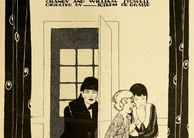Food, Love and Death in Norman's 'night Mother
By
2012, Vol. 4 No. 06 | pg. 1/2 | »
KEYWORDS:
Marsha Norman’s 1983 play‘night Mother is full of food imagery and references. From the opening stage directions to Jessie’s constant kitchen chores, food is intertwined in every moment of the play. Norman’s food references serve to show what is missing in the lives of Jessie and her mother Thelma and the ways they fill these holes with food. Jessie and Thelma have different strategies for this substitution, one creating through consumption, the other through preparation, but with close analysis through the lens of food advertising and psychological associations with food, love is found to be the driving motivation behind these preoccupations with food. Thelma has a voracious appetite for sweets. This is apparent from the opening scene of the play. The stage directions read: “Mama hums a tune as she stretches to reach the cupcakes in a cabinet in the kitchen. She can’t see them, but she can feel around for them, and she’s eager to have one, so she’s working pretty hard at it. This may be the most serious exercise Mama ever gets” (Norman 9). Jessie’s conversations with Thelma lead to the understanding that candy and sweets are a large part of Thelma’s diet. After Jessie has confessed her intentions to commit suicide, she goes about doing chores to keep Mama’s sweets stocked after she’s gone. “If you call the Sweet Tooth before you call the grocery,” Jessie says, counseling Thelma on the process of ordering her edibles, “that Susie will take your fudge next door to the grocery and it’ll all come out together” (Norman 20). Throughout the night, Jessie refills both the honey and sugar jar, replenishes the candy bowls, and cleans the empty papers out of Thelma’s box of chocolates. Sweets for Thelma are a replacement for love. Laura Morrow in her article “Orality and Identity in ‘night Mother and Crimes of the Heart” (1988) says, “Sweets are for [Thelma] a happy substitute for genuine human interaction; they provide Mama with the sensual gratification and the sense of fullness she failed to obtain from her marriage.” Thelma’s constant consumption of sugary treats can be interpreted as an attempt to solve her feelings of discontent. She latches on to the idea suggested by Jessie that she make hot chocolate and caramel apples. This is another attempt to change Jessie’s mind about suicide. If Thelma could just get Jessie to feel the same sense of love from food that she does, maybe she could save her.In Food is Love, a book about food advertising and gender roles, by Katherine J. Parkin (2006), the concept that eating and preparing food could create love is attributed to savvy advertising companies. “Campbell and other companies used . . . advertising to extend their claims beyond their products’ appeal to suggest that their foods would generate such powerful love that it could help people overcome their worst disappointments or tragedies” (Parkin 35). Thelma seems to buy into this concept, turning to sweets for love and companionship. She finds so much comfort in sweets that she puts them above people. Morrow uses Thelma’s statement that she would rather not go stay with Dawson and Loretta after Jessie’s death because “All they’ve got is Sanka” to show that “she finds her stimulation and contentment in food rather than in people” (Norman 54) (Morrow). This inversion is intertwined with the fact that Thelma never loved her husband. She seems to have been quite young when she married him, and there is no mention of any other lovers, so it is safe to assume Thelma has never been in love at all. She cannot even rely on the memory of love to sustain her, so she must consume even more food to fill that void. Thelma’s approach to food is similar to that of the main character in Patrick White’s The Ham Funeral, Mrs. Lusty. Gayle Poole discusses Mrs. Lusty and her food philosophies in Reel Meals, Set Meals (1999): “Though for Mrs. Lusty, a table may just be a table and no more, food is more than mere food. Mrs. Lusty understands the world by ingesting as much of it as she can manage. By digesting (assimilating) food she can digest the world (to a manageable form)” (157). Thelma also uses food as a way to take in the world in manageable doses; however, she doesn’t just eat anything that crosses her plate. She is very picky about what she consumes and has absolutely no use for nutritious foods. The only food she mentions liking that isn’t a dessert throughout the entire play is tuna, and she even ridicules Agnes for eating okra: “It’s all the okra she eats. You can’t just willy-nilly eat okra two meals a day and expect to get away with it. Made her crazy” (Norman 29). For Thelma, the consumption of food is not about sustaining herself for a longer life. It is all about distracting herself and trying to make the life she does have a little sweeter. Says Katherine H. Burkman in “The Demeter Myth and Doubling in Marsha Norman’s ‘night Mother” (1990): “Rather than having a true appetite for life, Mama’s appetite for sweets symbolizes her need for a slave for her death-in-life experience, a way of filling up emptiness and hiding from her fear of life and death.” Although Thelma’s sweets give her a feeling of love, she knows they are only a distraction, not a cure, for her loneliness and dissatisfaction. Thelma attempts to fix Jessie’s relationships and problems with food as well. The first time Ricky, Jessie’s son, is brought up in the play, Jessie claims that she doesn’t care what he does, but Thelma still has faith in him and “sees [his] redemption in terms of food” (Burkman). “He just needs time, sugar. He’ll get back in school or get a job or one day you’ll get a call and he’ll say he’s sorry for all the trouble he’s caused and invite you out for supper someplace dressup” (Norman 12). Thelma truly believes that after a lifetime of criminal activity and disrespect to his family a nice meal should redeem Ricky in Jessie’s eyes. The hot chocolate is another failed attempt at rekindling Jessie’s will to live. “We should have had more cocoa,” Thelma says. “Cocoa is perfect” (Norman 29). The “should” in this line is incredibly revealing. Thelma is allowing herself to think that if she had just made more cocoa, given Jessie more sweets, then Jessie wouldn’t want to kill herself. Jessie’s attitude towards food in the play is very different from her mother’s. Jessie only consumes a single taste of hot chocolate over the course of the entire play. “Jessie knows she could choose to live rather than to die, but she lacks the appetite for the choice” (Burkman). This is clearly shown in Jessie’s line: “It was maybe, if there was something I really liked, like maybe if I really liked rice pudding or cornflakes for breakfast or something, that might be enough” (Norman 50). But Jessie cannot find that passion for food, or for anything in fact. The only thing Jessie does show some liking for is smoking. She claims Cecil left her for refusing to quit and describes her relationships with cigarettes thus: “Smoking is the only thing I know that’s always just what you think it’s going to be. Just like it was the last time and right there when you want it and real quiet” (Norman 38). Smoking is Jessie’s food replacement. This is a very purposeful choice made by Norman, because smoking is highly destructive, yet it is this what Jessie finds solace in. Morrow relates Jessie’s cigarette addiction to her use of the gun as well: “Norman here invokes the traditional metaphorical fusion of gun, cigarette, and phallus as symbols of personal power.” It is the power that Jessie gets out of smoking that she really appreciates the most. The gun also serves as an symbol of food replacement. When Thelma asks Jessie where she got the bullets from, Jessie replies, “Feed store Dawson told me about” (Norman 14). She’s not getting feed from the feed store, rather something destructive and powerful—things that are much more important to her. Jessie’s main relationship to food is preparing and procuring it for her mother. She always orders the groceries, stocks the cabinets, and cleans the kitchen. This is partially another way that Jessie attempts to claim power. As Poole asserts, “Food gives control to those who choose, buy and prepare it, but that is secured often at a high price” (173). Not only does she use it to exert control, Jessie also uses the preparation and procurement of food to fill a void left by lack of love. The same advertisers who Parkin claims created the idea that consuming food creates a feeling of love, “hoped that the mantra ‘food is love’ would forever tie up their targeted consumers in an arrangement of women shopping and cooking to express their emotional commitment to their families” (Parkin 36). Instead of eating being a way of feeling love within oneself, shopping for and preparing food is a way to show others that they are loved, and hopefully receive love from them in return. “Food advertisers also exploited the connection between food preparation and love towards women, enlisting mild allusions, floating hearts, and pecks on the cheek to demonstrate how her food selection accorded her affection” (Parkin 40). Morrow describes Jessie’s actions thus: “Jessie’s love for Mama is revealed by her concern with her mother’s eating habits. Her cleansing and replenishing of the various containers for sweets—the candy dishes, the sugar bowl, the honey jar—are ritualistic actions that define her relationship to her mother’s world, in that Jessie sustains but does not partake of.” For her criminal son Ricky Jessie wants to provide some way of keeping him fed. This is the idea behind leaving him her watch. “I’d like to buy him a good meal,” she says (Norman 56). Even Jessie, the girl with zero appetite, tries her best to create and display love with food. Jessie’s request for hot chocolate is the only moment in the play where she shows some affinity for food. “I mean, I could ask you things I always want to know and you could make me some hot chocolate. The old way . . . And I’d like to have a caramel apple and do your nails” (Norman 27). After Jessie convinces Thelma to cook for her, the stage directions declare, “We have a truce, for the moment” (Norman 27). Although Jessie’s appetite hasn’t really changed, she doesn’t even end up eating either of the items she requests, this is a telling moment of her love for Thelma and perhaps a final test for herself, to see if she really is ready to go through with her suicide. She knows that asking Thelma for the hot chocolate will calm her down and give her something to do, but she also is testing her statement that if there was something she really liked, it might be worth staying alive for. Ultimately, this attempt fails, leading to Thelma’s declaration, “You never liked eating at all, did you? Any of it! What have you been living on all these years, toothpaste?” (Norman 36). Thelma is beginning to realize and understand, against her will, Jessie’s lack of appetite for life.Continued on Next Page » Suggested Reading from Inquiries Journal
Inquiries Journal provides undergraduate and graduate students around the world a platform for the wide dissemination of academic work over a range of core disciplines. Representing the work of students from hundreds of institutions around the globe, Inquiries Journal's large database of academic articles is completely free. Learn more | Blog | Submit Latest in Theatre |










